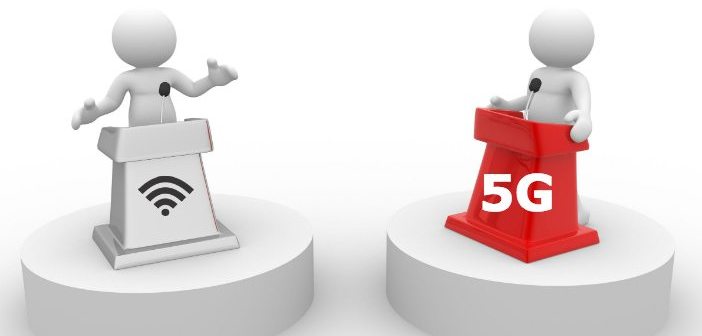
Should there be a rivalry between 5G and Wi-Fi, or are they separate entities?
For some technology experts, mainly 5G sceptics, there is a debate between whether or not 5G is needed now that Wi-Fi is so readily available and perhaps provides all that is needed. Many don’t share this view, particularly due to the fact that a lot of the arguments against 5G come from the dated views from Wi-Fi vs 3GPP.
5G is getting closer and closer as technology and cellular network providers move forward, and thus it is particularly useful to define the terms we are using in relation to this technology when arguing it’s potential effectiveness.
If we are talking about the actual radio standard in terms of 5G, then it would make sense that it will simply be a continuation of 4G. This means that the technology stems purely from the cellular community.
It is widely thought that Wi-Fi will continue on a different track for at least another generation of technology in this vein. Despite some recent progressions suggesting that Wi-Fi will introduce something more substantial, it seems to have lost it’s chance to contribute to the fundamental standards seen by current cellular technologies.
There was some convergence between 802.16 (WIMAX) and 4G, but if the two are indeed to come together once again, we would be looking at 5.5G or 6G.
There will be Wi-Fi extensions that will have some of the same characteristics of a 5G network but won’t be part of the main standards. Currently there are plenty of organisations that would choose a Wi-Fi network rather than a type of cellular network.
Some argue that there if Wi-Fi wants to be the ‘real 5G’ technology then there will be some new challenges. In radio terms, this argument centres around Wi-Fi fulfilling all the requirements for 5G without needing any new cellular standards.
The biggest difference between 4G and 5G will be that cellular 5G will be readilty available in an unlicensed and shared spectrum. This will make it far more available and appealing to stakeholders, and a more realistic possible alternative to Wi-Fi should someone want it, particularly for non mobile network operators.
Caroline Gabriel of Wireless Watch blog details this issue quite well in her abstract from “IEEE seeks closer collaboration with 3GPP, which could create ‘true 5G’” :
THE EXPERIENCE OF WIMAX CERTAINLY SHOWS HOW DIFFICULT IT IS FOR A STANDARD TO SUCCEED IN THE MOBILE WORLD, IF IT COMES FROM OUTSIDE THE FAMILY. AND THAT CERTAINLY SUGGESTS THAT, AS WELL AS CONSIDERING WHETHER TO SUBMIT TO IMT-2020, IEEE 802.11 SHOULD FORMULATE A CLOSER RELATIONSHIP WITH THE 3GPP, TO ENSURE THAT THE TWO SETS OF STANDARDS ARE IN STEP, AND END UP BEING NATURALLY COMPLEMENTARY RATHER THAN CLUMSILY TIED TOGETHER, OR EVEN COMPETITIVE.
There is however a different definition of 5G as not merely a radio standard but a completely new network architecture. Parts of this are already evolving within Wi-Fi and 4G technology (e.g. virtualisation, carrier aggregation).
Using this definition makes it completely irrelevant to argue whether 5G or Wi-Fi will be superior as the main focus is to be able to mix and match different radios in various spectrum bands. These can be tweaked based on use case, cost and availablility. This dynamic multi-technology creates a more flexible network in which the barriers between Wi-Fi and 5G are broken down, having a transformative effect on business cases and applications. It doesn’t really matter whether it comes from IEEE or 3GPP.
The most important aspect here is the technological advances that a new architecture provides. There doesn’t seem to need to be an argument over whether Wi-Fi makes 5G unneccessary or a debate of Wi-Fi vs Cellular. Wi-Fi will likely remain a popular choice among the majority of business cases, and cellular 5G will undoubtedly provide new business opportunities as well.
